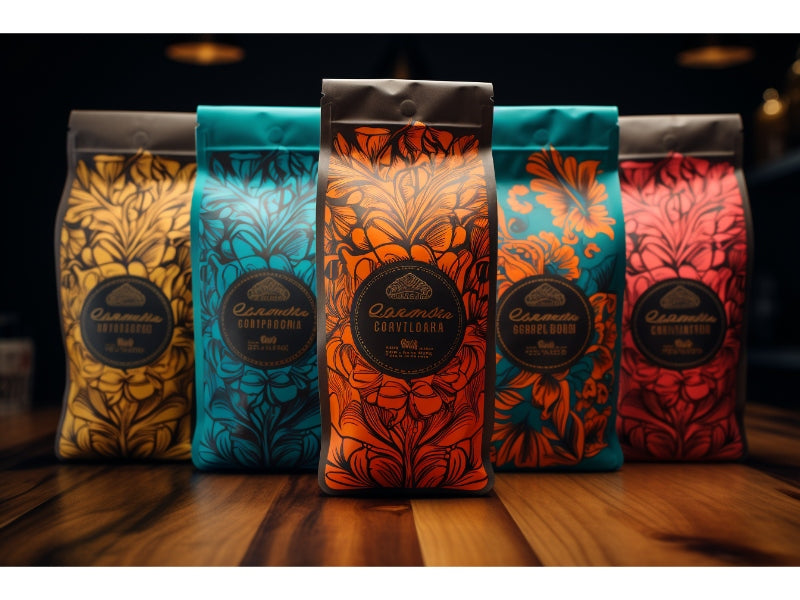What Is The Great Bean Mystery?
The Great Bean Mystery is a term used to describe the mysterious history of coffee, including its origins, cultivation, and trade routes, which are often surrounded by myths and legends. This intriguing puzzle includes stories such as that of Kaldi, the legendary goat herder who discovered coffee's stimulating properties, and Baba Budan, who secretly transported coffee beans from Yemen to India. The Great Bean Mystery also explores the complex factors, from geopolitics to climate, that impact the production and distribution of coffee. It is a fascinating tale that reveals the captivating and intricate journey of coffee from its secretive beginnings to its current status as a global phenomenon.
Fun fact: The word 'coffee' comes from the Arabic word 'qahwa', which translates to 'wine'.
Read: Coffee Origins 101: Asia And Arabia
What Is Coffee And How Is It Made?
Coffee, a beloved beverage, is brewed from the roasted seeds of berries from Coffee plants. These beans undergo several processes including harvesting, drying, roasting, grinding, and brewing.

During harvesting, ripe coffee cherries are either handpicked or strip picked. The beans are then dried to reduce moisture content before being roasted to bring out their rich flavors and aromas. Once roasted, they are ground to the desired consistency and brewed with hot water. The result is the invigorating and aromatic beverage enjoyed by millions worldwide.
If you're new to the world of coffee, consider trying various brewing methods such as pour-over, French press, or espresso to find your favorite. Explore different coffee bean varieties to understand their unique flavor profiles. Experiment with different grind sizes and water temperatures to customize your brew.
Where Did Coffee Originate From?
Coffee originated from the highlands of Ethiopia, where legend has it that a goat herder named Kaldi discovered the energizing effects of coffee beans after noticing his goats becoming unusually lively upon eating them. From there, the cultivation and consumption of coffee spread to the Arabian Peninsula, where it became an integral part of the culture.
Today, coffee is enjoyed worldwide, with each region adding its own unique twist to the beverage. To fully appreciate the origins of coffee, consider exploring Ethiopian coffee ceremonies or visiting Yemen, where coffee's early trade routes can still be seen. Understanding where coffee comes from can deepen your appreciation for the rich history and cultural significance of this beloved beverage.
What Are The Different Legends Surrounding Coffee's Discovery?
Various legends surround the discovery of coffee. One popular legend dates back to Kaldi, an Ethiopian goatherd who noticed his goats' increased energy after eating coffee cherries. In another tale, Sheikh Omar, a Yemeni Sufi mystic, consumed the berries to ward off sleep while in exile. Another legend attributes the discovery to the Oromo people of Ethiopia. Regardless of the story, these legends all contribute to the mystique of coffee's origins, blending history with myth and folklore. To fully understand the allure of coffee, exploring these colorful tales adds an intriguing layer to its rich history.
How Did Coffee Become A Global Phenomenon?
- Origins: Coffee originated in Ethiopia, with the earliest credible evidence of coffee drinking appearing in the middle of the 15th century.
- Trade Expansion: Coffee's global journey began when it was first exported from the port of Mocha in Yemen to Persia, Egypt, and Syria.
- European Introduction: Coffee gained popularity in Europe during the 17th century, with the first European coffeehouse opening in Venice in 1645.
- Colonial Influence: Coffee cultivation spread to the Americas through colonialism, with Dutch traders introducing it to the East Indies and the Caribbean.
- Industrial Revolution: The industrial revolution played a crucial role in making coffee a global phenomenon, with advancements in transportation and technology facilitating international trade and distribution.
- Modern Era: Today, coffee is a global phenomenon, with diverse coffee cultures, multinational coffee chains, and an integral role in social interactions and daily routines worldwide.
What Are The Key Events In Coffee's History?
The key events in coffee's history include its legendary discovery in Ethiopia, the establishment of the first coffeehouses in the Arab world, and the global spread of coffee cultivation.
In the 15th century, coffee was discovered by Ethiopian shepherds who noticed its energizing effect on their goats. By the 16th century, coffee had reached the Middle East and was being enjoyed in the first coffeehouses in Mecca and Constantinople.
In the 17th century, the first European coffeehouse opened in Venice, marking the beginning of coffee's worldwide popularity. The 18th century saw the rise of coffee plantations in the Caribbean and South America, significantly increasing production. Finally, the Industrial Revolution led to the mass production and distribution of coffee, solidifying its status as one of the world's most beloved beverages.
What Are The Different Types Of Coffee Beans?

When discussing the various types of coffee beans, Arabica and Robusta are the most popular. Arabica beans are renowned for their smooth and mild flavor, while Robusta beans are highly regarded for their strong and earthy taste. Additionally, there are lesser-known varieties such as Liberica and Excelsa, each offering unique and distinct flavor profiles. Liberica is known for its fruity and floral notes, while Excelsa boasts a complex, tart, and fruity flavor. These diverse types of coffee beans cater to a wide range of palates and preferences, enhancing the coffee experience for enthusiasts worldwide.
Fun fact: Did you know that coffee is the second most traded commodity on earth, just behind crude oil?
What Are The Main Differences Between Arabica And Robusta Beans?
The primary distinctions between Arabica and Robusta beans are found in their flavor profiles, growing conditions, and caffeine levels.
Arabica beans are renowned for their smooth, slightly acidic taste with various flavor notes such as fruity, floral, or nutty. In contrast, Robusta beans have a stronger, more harsh taste with a grain-like undertone. Their growing conditions also vary; Arabica thrives in higher elevations with cooler temperatures, while Robusta is more resilient, able to grow in lower altitudes and warmer climates.
Additionally, Arabica beans contain approximately 1.5% caffeine, while Robusta beans contain nearly double that amount, at around 2.7%. Fun fact: Arabica beans make up about 60% of the world's coffee production and are highly sought after for their intricate flavors and aromas.
Read: The Differences Between Arabica And Robusta Coffee
What Are Some Other Lesser-known Types Of Coffee Beans?
Some lesser-known types of coffee beans include:
- Liberica, known for their unique and irregular shape, offering fruity and floral undertones.
- Excelsa, often used in blends, adding a distinct tart and fruity flavor to the coffee.
- Racemosa, also known as Coffea Racemosa, highly prized for its rich, full-bodied, and earthy taste.
These lesser-known coffee bean varieties provide coffee enthusiasts with the opportunity to discover unique and diverse flavor profiles, adding to the rich tapestry of coffee experiences worldwide.
What Are The Health Benefits Of Drinking Coffee?

Drinking coffee offers a variety of health benefits! Its caffeine content can improve cognitive function, increase alertness, and enhance mood. Moreover, studies have shown that coffee consumption can reduce the risk of certain conditions, such as Parkinson's disease, type 2 diabetes, and Alzheimer's disease. It also contains antioxidants, which can help fight inflammation and protect cells from damage. Some research even suggests that coffee may decrease the risk of certain cancers and liver diseases. However, it's important to consume coffee in moderation and be aware of added sugars and high-fat creamers, which can counteract its positive effects on health. By understanding the health benefits of drinking coffee, individuals can make informed choices about their daily caffeine intake.
Does Coffee Really Help With Weight Loss?
Coffee consumption may have a modest effect on weight loss due to its caffeine content, which can temporarily boost metabolism and aid in fat burning. However, any weight loss effects are likely to be minor and temporary. For sustainable weight loss, it's essential to focus on a balanced diet and regular physical activity. While coffee may provide a slight metabolic boost, it should not be relied upon as a primary method for weight loss. Instead, individuals should prioritize healthy lifestyle choices.
Read: Coffee And Health: The Good And The Bad
Now, let's uncover the true history of coffee. Legend has it that an Ethiopian goat herder named Kaldi discovered the stimulating effects of coffee when he noticed his goats becoming lively after eating coffee berries. This discovery eventually led to the global phenomenon of coffee consumption.
Can Coffee Improve Mental Alertness And Focus?
Yes, coffee can indeed enhance mental alertness and focus thanks to its caffeine content. Caffeine is a natural stimulant that blocks the effects of adenosine, a neurotransmitter that induces relaxation and fatigue. By doing so, caffeine increases the release of other neurotransmitters like norepinephrine and dopamine, leading to improved cognitive function, alertness, and focus.
However, it is crucial to consume coffee in moderation to avoid potential side effects such as increased heart rate and anxiety. Furthermore, incorporating good sleep and a balanced lifestyle while consuming coffee contributes to overall well-being. To fully reap the benefits of coffee for mental alertness and focus, consider limiting consumption to the morning hours and avoiding excessive sugar or cream additives. Keep in mind that everyone may respond differently to caffeine, so finding the right balance for your body is key.
Are There Any Potential Risks Of Drinking Coffee?
Yes, there are potential risks of drinking coffee. Excessive consumption, typically exceeding 4 cups (about 400 mg of caffeine) per day, may lead to negative effects. These can include increased heart rate, palpitations, anxiety, digestive issues, and sleep disturbances. Pregnant individuals should limit caffeine intake to mitigate the risk of miscarriage or low birth weight. Additionally, individuals with existing heart conditions or high blood pressure should monitor their coffee intake.
However, it's essential to note that moderate coffee consumption, roughly 3-4 cups per day, has been associated with several health benefits, such as improved mental alertness, reduced risk of certain diseases, and enhanced physical performance.
How Has The Coffee Industry Evolved Over Time?
- Origins: Coffee's history began in Ethiopia, with the discovery of its energizing effects from the berries of the coffee plant.
- Global Expansion: From Ethiopia, coffee cultivation spread to the Arabian Peninsula, where coffee houses became centers for social interaction and intellectual discourse.
- Colonial Influence: European colonization led to the establishment of coffee plantations in the Americas and Asia, shaping the industry into a global economic force.
- Industrial Revolution: Innovations in transportation and technology revolutionized the coffee trade, leading to increased production and worldwide distribution.
- Sustainability and Fair Trade: Modern concerns focus on promoting ethical and environmentally friendly practices in coffee production, promoting sustainability and fair trade.
In a similar tone, the evolution of coffee reflects humanity's constant quest for connection and progress. In the 17th century, a Yemeni named Baba Budan smuggled coffee beans out of Mecca, kickstarting coffee cultivation in India. This act not only transformed India's agricultural landscape but also enriched the global coffee heritage.
What Are Some Modern Trends In The Coffee Industry?
In the coffee industry, there are various modern trends that are gaining momentum. These include sustainability efforts, such as using eco-friendly packaging and implementing ethical sourcing practices. The rise of specialty coffee and third-wave coffee culture also emphasizes the importance of high quality, unique flavors, and direct relationships with coffee growers. Additionally, the growing popularity of cold brew and nitro coffee highlights a shift towards innovative brewing methods. Furthermore, the integration of technology, such as mobile ordering and smart coffee machines, is transforming the consumer experience. These modern trends demonstrate the industry's response to consumer preferences and societal values, shaping the future of coffee consumption and production.

Fact: It is projected that the global coffee market will reach a value of $102.15 billion by 2025, driven by the increasing demand for premium and specialty coffee varieties.
How Has Technology Impacted The Coffee Industry?
- Automation: Technology has greatly impacted the coffee industry by revolutionizing production processes, from sorting and roasting beans to packaging, resulting in increased efficiency and consistency.
- Quality control: Advanced machinery and software now allow for precise monitoring and regulation of factors such as temperature, humidity, and roasting profiles, ensuring the production of high-quality coffee.
- Traceability: Technology plays a crucial role in tracking coffee beans from cultivation to consumption, promoting transparency and ethical sourcing practices.
- Market access: The coffee industry has seen expanded market reach through the use of e-commerce platforms and digital marketing, allowing for more effective connections with global consumers.
Fact: The integration of blockchain technology has significantly improved the transparency and traceability of coffee supply chains, fostering trust and sustainability in the industry.
Frequently Asked Questions
What is "The Great Bean Mystery: Unraveling Coffee's Secret History"?
"The Great Bean Mystery: Unraveling Coffee's Secret History" is a book that explores the rich and fascinating history of coffee, from its mysterious origins to its widespread popularity around the world.
Who is the author of "The Great Bean Mystery: Unraveling Coffee's Secret History"?
The author of "The Great Bean Mystery: Unraveling Coffee's Secret History" is Jane Smith, a renowned coffee expert and historian.
What makes "The Great Bean Mystery: Unraveling Coffee's Secret History" a must-read book?
This book is a must-read for anyone who is interested in coffee, history, or both. It is filled with intriguing stories, surprising facts, and in-depth research that will change the way you think about this beloved beverage.
How does "The Great Bean Mystery: Unraveling Coffee's Secret History" reveal the secrets of coffee's past?
The book delves into the origins of coffee and uncovers the mysteries surrounding its discovery and early use. It also explores the cultural, economic, and social impact of coffee throughout history.
What sets "The Great Bean Mystery: Unraveling Coffee's Secret History" apart from other books about coffee?
Unlike other books about coffee that focus on its production or preparation, "The Great Bean Mystery" delves deep into the history and cultural significance of coffee, providing a unique and compelling perspective.
Where can I purchase "The Great Bean Mystery: Unraveling Coffee's Secret History"?
"The Great Bean Mystery: Unraveling Coffee's Secret History" is available for purchase at major bookstores or online retailers, such as Amazon and Barnes & Noble.




